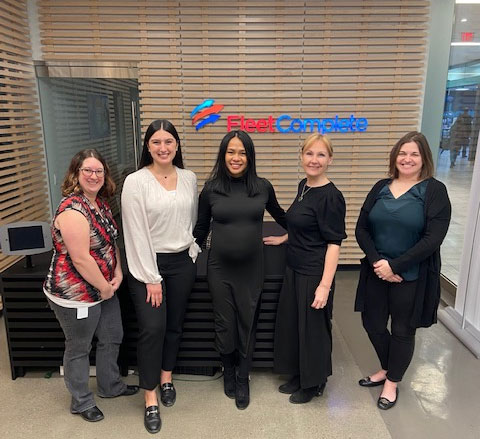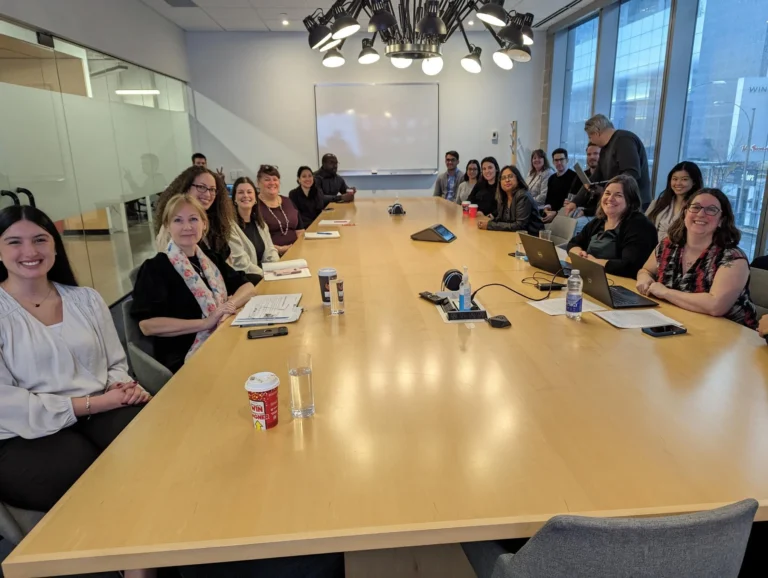According to an Accenture report, nearly half of the women in technology roles in the United States drop out by the age of 35. The report goes on to say that in inclusive environments, women can thrive, and achieve key milestones like being promoted, advancing to management roles and remaining in tech throughout their careers. These statistics align with those from a recent Randstad Canada article, which says less than a quarter of people in STEM careers in Canada are women, although 34% of those with STEM degrees are women.
March was International Women’s History Month worldwide. Last week, the Powerfleet (formerly Fleet Complete) Diversity, Equality and Inclusion (DEI) Committee hosted a panel to share insights, and discuss the contributions of women in the company, and the evolving global telematics and technology industry trends.
Men and women from various departments participated in an engaging discussion about women in technology, science, engineering and mathematics (STEM). And more to the point, how women play an increasingly important role in our success.
Diversity, equity and inclusion are foundational to our success at Fleet Complete and part of our cultural norms. Our employees feel that they are fully supported by their leaders and the organization when it comes to DEI. Women feel empowered to have an impact and be successful in our organization, and positive strides that have been taken to promote women into leadership roles. There is always room for improvement in any organization, and we are committed to supporting each other regardless of gender, race, and cultural background.
Carmel O’Meara-Morrison, Vice President of Human Resources at Fleet Complete Tweet
Women in Technology in Canada and Beyond
Our DEI Committee and the Women in Technology panel included professionals from diverse backgrounds, including Ireland, Colombia, Australia and Canada.
The DEI Panel – Marilou Gourdeau, Ana Caceres, Irene Cabading, Carmel O’Meara-Morrison and Claire Richards
According to a recent study of first-year University of Waterloo students, females represented:
- 23% attending technology programs
- 24% attending computing and finance programs
- 29% attending software engineering courses
Ana Caceres is a member of the DEI committee. She has worked at Powerfleet (formerly Fleet Complete) as a Product Manager for two years, most recently focusing on our FC Vision video telematics solutions. Ana said, “STEM careers are not for everyone, but there are more opportunities than many women realize. They should identify their strengths and skills and explore how to apply them by working for companies like Powerfleet (formerly Fleet Complete). It’s important to have a continuous learning mindset and partner with a mentor.”
My advice would be to get to know yourself. Know who you are, know your strengths, your weaknesses and your limitations. If you want something to change, you must use the tools that are under your control. Surround yourself with your tribe of colleagues. We often talk about “our tribe” being close friends and relatives. But you need to find a workplace tribe too. Make it cross-functional, don't limit it to just your department.
Kim Vilaca, Senior Finance Manager Fleet Complete Australia. Tweet
How Can Spouses Encourage More Canadian Women Toward STEM Career Paths?
The panel discussed the opportunities Canadian women have in STEM and the key role that men have, and will continue to play in mentoring, encouraging and sponsoring women in technology, engineering and science, and non-technical roles. Networking with other women in technology, as well as creating a tech community that offered encouragement and support were some of the recommendations coming from the group discussion.

Work-Life Balance in the Hybrid Workplace Era
Many of the challenges faced by women in tech as well as non-tech roles is work-life balance. While there is recognition that men have stepped up to support more on the home front, women generally are the primary caregiver for children and elder family members. The panel spoke about this challenge at length.
“Men often take the effort women put into managing the household and caring for their children for granted, even when both parents work full-time,” said Claire Richards, Senior Supply Chain Coordinator at Fleet Complete.
Sharing family and household responsibilities is so important. Many women experience burnout because they are juggling so many responsibilities at work and in their personal life. Over the pandemic, lots of men were surprised to discover how much time and energy goes into managing day-to-day responsibilities. Hopefully, that will result in a better balance of duties relating to the home and family.
Claire Richards, Senior Supply Chain Coordinator at Fleet Complete. Tweet
Of the many recommendations that emerged from this session, one that stood out for most was for both women and men to think about balancing the distribution of work at home and to make their partner a true life partner!
Are you interested in learning more about our workplace culture at Powerfleet (formerly Fleet Complete) and our current opportunities? Visit our Careers page.







